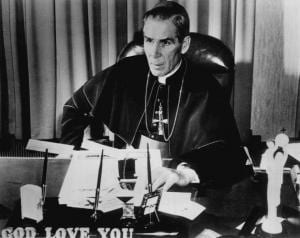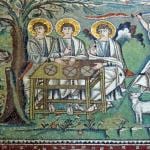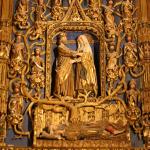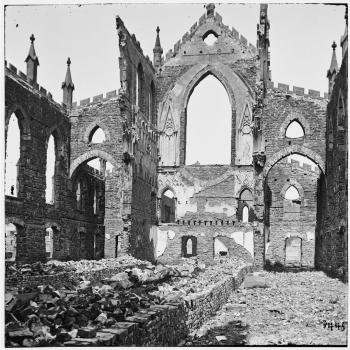
The beatification process of Fulton J. Sheen has been brought to a halt. This is not the first time. Why this has happened is a mystery. There are all kinds of speculations and rumors going on, from some suggesting political intrigue against Sheen being the reason, with others fearful that some blight has been discovered on his record which should have been found previously but was not.
Now, there are rumors, such as those coming from Rocco Palmo, which may or may not be true, that suggest that the process has not only been halted, but been permanently put to rest. Once again, speculations have emerged as to why this is the case, including that something truly was found in his record which would embarrass the church, to some sort of political triumph of those who were envious of Sheen.
Without knowing whether or not the beatification has truly stopped, or just put to a halt, and without knowing the reasons behind the rather unusual (though not entirely unprecedented) halting of the process of beatification, we need to be careful and accept that the church has good reasons behind its actions. There is no need to speed through the process of beatification or canonization if some new question emerges; twenty years of study is nothing in regards documentation, because, as it is often the case, new documentation comes to light as time as time goes by. Those who try to hide facts and evidence it harder and harder to do so, until the truth comes out. To portray those who raise questions as being envious not only represents the same kind of mistake which the church used to hinder investigation of clergy sexual abuse, it is potentially very calamitous in nature.
Canonization is an important process within the church. Many great saints took centuries for their cases to be examined before they were canonized. Some potentially great saints have yet to be canonized, such as blessed Duns Scotus, Peter Lombard, Nicholas of Cusa and Cardinal Bessarion. But, if they are saints, they do not need to be canonized in order to be saints. Nor do the faithful have to wait for canonization in order to venerate and ask for the help of those they believe to be saints. Private devotion to those not yet canonized is one of the ways in which the canonization process begins. Canonization is more about the person being a saint, but about them being officially recognized with a public cult by the church itself, and in doing so, being presented as an exemplar for the faithful to imitate with their lives.
The nature of canonization therefore requires those the church officially proclaims to be a saint to be of such a nature their canonization does not confuse the faithful, that their livelihood and work is (on the whole) worthwhile of imitation and their elevation to canonized sainthood would not end up embarrassing the church. Certainly, saints are not perfect, and even great saints have records of great sins within their lives (St. Jerome always comes to mind when I think of a saint who did a great amount of good to some, but a great amount of unjust harm to others). Nonetheless, if there is a discovered a fault within a potential saint which would embarrass the church if the church were to canonize them at the time of canonization, a fault which had been hidden and made known during the time of canonization, the church can wisely put a stop to the canonization (or beatification). Thus, for example, when the church is trying to overcome its poor record in dealing with sexual abuse by the clergy, if a potential saint has been claimed to have mishandled sexual abuse accusations under their authority ,the church can wisely stop the canonization in order to indicate it understands the problem and is working to change its ways instead of accepting the way it covered up accusations in the past. This would not say the potential saint is not a saint, nor they will be proven guilty of the accusation, nor that their canonization cannot be approved later with the caveat indicating that any of their mistakes are not approved by the church, but to do so in the midst of reforming itself on the issue of sexual abuse cases certainly would be foolishness as it would seem to indicate the church has not learned from its own mistakes.
Thus, my thoughts on the nature of Fulton Sheen are these: if he is truly a saint, canonization Is not necessary. If the people who are inspired by him are inspired by works which say good and true things, canonization is not necessary for that influence to be good and true. If he is not a saint, then providence is at play, and we should be thankful that the beatification process has been put to a halt. In either case, those who respect and venerate Fulton Sheen can continue to do so, while those who feel that the process of canonization is being rushed and still have questions about him can feel more satisfied that the church is looking further into his record to make sure those suspicions are unfounded. He can be a saint, even a canonized saint, even if he mismanaged some sexual abuse claims, if the church rightfully points out the problem as says the canonization does not mean any approval for such foolishness (after all, St. John Paul II certainly suffered from this problem), but is it wise to push his beatification forward if there truly are questions concerning his administration as a bishop? Probably not, because the more the church pushes such saints through the process of canonization, the more it will seem to the public the church does not care about such charges. Sexual abuse is a major concern. The church must do all it can to demonstrate it understands this, even if it means halting the process of canonization of any potential saint who was a bishop who now has credible questions as to how they handled sexual abuse claims of clergy under the authority. Even if there are no credible accusation, but just rumors of it, the church is wise to do what it can to prove those rumors false before going forward with his beatification. Obviously, this seems to be what is at issue here. But even if this is not the reason, but other issues have emerged, the church is wise to take those into consideration and do what it can to deal with them before rushing his beatification. Even if, in the end, this means his beatification is permanently stopped, this does not mean people cannot venerate Fulton Sheen. They can. Nothing has changed with that.
Stay in touch! Like A Little Bit of Nothing on Facebook.
If you liked what you read, please consider sharing it with your friends and family!












